#enstars analysis
Text
trans allegory in mystic fragrance and forbidden rain
aka: the essay no one asked for
Content warnings for: Discussions of homophobia and transphobia, and brief mentions of suicide.
If you guys have any other comments on this topic (especially KnightsPs, I'm an UNDEADP so I'm less familiar with their lore) please comment or rb or drop an ask or anything! I love talking. It's also been a hot minute (3 or 4 years) since I last took an English class so my analysis is a little rusty.
Part 1: UNDEAD's "Monster" and Queerness
Every UNDEAD song (with one exception) has the same premise — the singers are the impure, immoral monsters who are singing to a pure, human audience. There are two genres of UNDEAD song:
“I’m a monster seducing you into the darkness, give into your desires because I know that secretly you want it too” — Immoral World, Savage Love Affair, etc.
“I’m a monster and I’m so badass” — Darkness 4, Nightless World, etc.

Darkness 4 lyrics, translation by Shirayukin on Fandom wiki.
The “monster” in UNDEAD’s music is shorthand for anyone that exists outside of a pure society. By joining the monsters, you become tainted and can't return to society, but that’s the only way you can possibly live as your authentic self. In this way, the "darkness" is a safe space that these monsters have created for themselves.
This is, of course, a reference to Rei and how he feels ostracized from society -- the whole reason why Koga began UNDEAD was as a message to Rei that if Rei felt like a monster, he shouldn't roll over and die, but live with them as an undead. However, the concept of the queer monster is incredibly applicable imo. Historically, lots of villains in horror media were queer-coded as a way of eliciting disgust or a fear response, as a way of making its villain seem strange and, well, queer. (Oh, no! Look at all these horrible people ruining life for the law-abiding families!) The link between queerness and horror has been analyzed to death.
But queer people also love the misunderstood monster who's shunned by "proper" society. The gothic novels that originated the horror genre in the 1800s, like Dracula or the Picture of Dorian Grey, were written by queer authors and/or contained scores of queer themes. Do I need to go into why werewolves, shapeshifters who had to go deep into the woods to hide their wolf form, can be read as queer? Do I need to go into why Frankenstein, someone abandoned by his own creator and shunned by society by the nature of his existence alone (something out of his control), can be read as queer? Do I really need to go into why the modern-day vampire is queer? Vampires? Of course queer people will love these monsters, because they see themselves in the monsters, more so than the victims. (Also, nothing more in line with the queer experience than seeing a monster and going “ngl they're kinda hot actually.”)
In summary: It's very easy to read UNDEAD songs and UNDEAD's conceptualization of the "monster" through a queer lens. The monster is queer, and the monster welcomes you into the darkness and invites you to also give into your desire to live freely.

Immoral World lyrics, translation by Mandy on Fandom wiki.
Also, shout out the love you tried to hide, huh? Show me your truth? Show me your pride?
Dude.
Dude.
Sidenote: The one exception to this “monster” theme is of course the elephant in the room, Sustain Memories. I think it plays well into UNDEAD’s image — at least in !-era, Rei, Adonis, and Koga have always been the monsters, while Kaoru is the human that joined them (see: their Halloween costumes in !-era). So Kaoru doesn’t sing of monsters, he sings of a human love. There's also something to be said about Kaoru being the one member of UNDEAD who tried so desperately to appear cishet and experience a "normal" love in !-era. But also, it's a wedding song because the anime boys look cute when they sing about weddings.
Part 2: What about Forbidden Rain?
Here's the thing about UNDEAD's other monster songs -- they're always proud of being monsters. They're not ashamed, and they want the audience to join them in their freedom.

Forbidden Rain lyrics, translation by @/snaketaper on Twitter.
On the other hand, the singer in Forbidden Rain sees themselves as a "beast" who can never be forgiven, someone who's slowly poisoning their pure lover. They love them so much that they apparently have to let go of them, for their own sake. It's the first song that actually contains references to genuine love (usually UNDEAD is just horny).
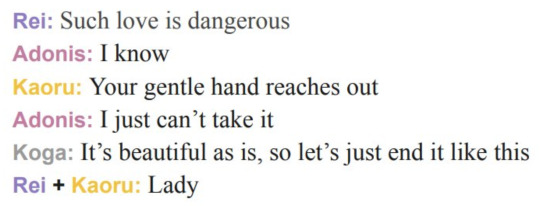
The song remains sort of ambiguous about the nature of the relationship between the singer and the audience. It's clear that the audience does actually care for the singer, since they do reach out a "gentle hand" that the singer can't take. But the singer says, "Let's end this thing that never even began" -- are they even together in the first place? Maybe it never began because they were scared of the "beast." Or maybe it never truly began because the relationship was built on a lie. They sing about a beast inside them that they have to hide, and says that their current self -- the one they show to the audience -- is a fake. And this is something that cannot be forgiven.
It's not hard to read this in the context of queerness. Maybe it's about a gay singer who doesn't want to reveal their feelings and tarnish a platonic relationship. Or maybe it's a trans singer who's wracked with guilt at keeping their identity under wraps and hasn't come out to their heterosexual lover, so they want to break off things before they come out and taint their previous relationship.
In Love & Beast, the "source material" behind Forbidden Rain, Inogari (Adonis' character) is soft-spoken, protective, and kind. He saves the main police character in the very first scene. He's an ambassador and a respected enough member of society that he's part of the Sakurayama (Rei's character) social club. He uses "watashi," which is even more polite than Adonis' "ore." He literally faints at the sight of blood. He's the picture of innocence and goodness and all that society approves of. But in a Jekyll and Hyde-like twist, he ends up secretly being the killer Beast. In the end, the Beast is finally caught when Inogari realizes the truth and chains himself to a wall so he can be caught by the police in an act of sacrifice.
Inogari is the picture of propriety, but he keeps the Beast repressed, and eventually this Beast destroys him. Even if you try your best to act as part of proper society, you'll never really fit in.

Silent Oath lyrics, translation by royalquintet on Fandom wiki.
Another note: Forbidden Rain has a lot of the same themes of self-sacrifice, repression, and pure, romantic love that Knights songs do. Knights, in game, is a much more traditional idol unit than UNDEAD is. Forbidden Rain thus attempts to align itself more closely with the socially acceptable Knights, but it's still an UNDEAD song at its core. The monster is inescapable.
Part 3: Mystic Fragrance and Trans Allegory
This thread by @/pretty5P on twitter (https://x.com/pretty5p/status/1625958198623539200?s=46&t=lm_x5Uw5f8pKXHUoLzYksw) is a really cool analysis on the perfume symbolism in the song and how it relates to Arashi's gender identity (go read it!!), but if you don’t want to give Elon Musk ad revenue, the gist of it is this: Odette is her "masculine" initial impression, the impression others have of her, and the impression that fades most quickly. Odile is her lasting "feminine" self and the true self that remains when the top notes fade away.
Over the course of the song, the singer (Odette/Odile) grows more and more tainted, going from a pure white dress to a multicolored rainbow dress to a pitch black dress. The final perfume note is desire, the desire to live as themselves, the desire to be with the person they love.
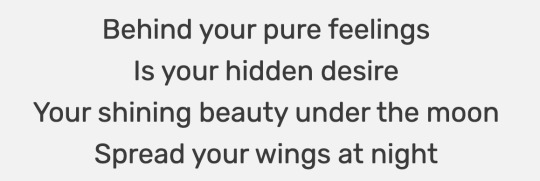
Mystic Fragrance lyrics, translation by KYM2020 on Fandom wiki.
While the song does focus on a pure romantic love, just like Knight's songs, the symbolism of wanting to be Odile is far more similar to UNDEAD's monster. The idea of a "hidden desire" lying in wait beneath pure feelings is explored in almost every song, as is the symbolism of a dress that gets tainted by desire:

Savage Love Affair lyrics, translation by Nina on Fandom wiki.
And just like UNDEAD songs, the "tainting" of the pure is never presented as a bad thing. Note the references to the moon in both -- it's only in the dead of night, in a midnight ballroom, that one can "spread their wings" and reveal their true self. The darkness, the space of monsters, is a safe space, and in the light of the truth-seeking moon the singer of Mystic Fragrance says that their audience is beautiful.
In the original Swan Lake ballet, Odette is a beautiful woman who falls in love with Prince Siegfried. She's cursed to transform into a swan in the daytime, a curse that can only be broken if someone who has never sworn their love to anyone swears their love to her (in other words, someone untainted). Unfortunately, the evil sorcerer who cursed her turns his daughter into Odile, the black swan who looks identical to Odette, and Siegfried mistakenly confesses his love to her. Knowing that the curse can never be broken, Odette throws herself into the lake rather than live the rest of her life as a swan, and Siegfried joins her.
Mystic Fragrance isn't tragic, however.
Part 4: Living your truth
The endings of Forbidden Rain and Mystic Fragrance are where they differ. Both of their source endings are tragic — Inogari is unable to control the Beast and shackles himself to a wall, waiting to be arrested. Odette and Siegfried leap into a lake and drown themselves, because the only way they can be together is in death. Forbidden Rain ends with the singer holding their loved one close to them one last time in the rain before they leave.
But Arashi rejects her source material because she chooses to embrace the monster. She becomes Odile. She decides to live her truth, and as the top notes and heart notes fade away, all that lingers is her true self. That's why Mystic Fragrance has a happy ending.
There's a lot of symbolism in the Mystic Fragrance music video with respect to the person who loved Arashi during the war era and who killed themselves. She spreads her arms like the wings of an angel and sings in front of a setpiece that looks like the cenotaph. Her outfit contains anemones, symbols of a lost love and grief (and, coincidentally, the flower that Adonis in greek myth turned into when he died). Her greatest regret was that that person couldn't love themselves the way Arashi now tries to love herself. In this way, Mystic Fragrance is like a message to that person -- live your truth.
#adonis otogari#arashi narukami#enstars undead#enstars knights#adoara#enstars analysis#this one is a doozy#i wrote 90% of this in a sleep deprived haze at 3 am and then filled in the blanks in the morning#anyway if you have any thoughts please tell me!! send an ask or leave a comment or send a message via carrier pigeon#my stuff
109 notes
·
View notes
Text
Mika/Ritsu Dorm Thoughts (Part 1?)
Listen, I know we all love the Goth Dorm™, but it was actually probably REALLY good for Mika and Ritsu from a physical, mental, and social standpoint.
Mika who now has to eat more properly because he needs to cook for Ritsu, and Ritsu who now skips less meals due to sleep because Mika always has something waiting for him.
Mika who is dragged to bed from his late work under the pretense of "cuddles" by Ritsu, and Ritsu who is woken up by Mika because they can't be late to meet Naru for breakfast.
Mika and Ritsu who can fill their dorm with all the dark horror things that don't fit their idol "image", who can have as many pillows and stuffies as they want because they know the other won't make fun of them for it.
Mika and Ritsu who never see each other as just "Rei's brother" or "Nazuna's replacement", Ritsu who sees Mika as an artist instead of a doll, and Mika who sees Ritsu as a knight instead of a damsel, even before they themselves could look past those labels.
Mika and Ritsu who were so hurt by the war, who felt like nobody else in their grade could understand the feeling of being tossed aside and looked down upon, only to meet someone else just as haunted, who stayed in the back of the class, who felt there was something indescribably wrong with them.
Mika and Ritsu who don't push or pry, but will bring each other their favorite snack or put on the most poorly-made B-rate horror movie, just to see a small smile on the other's face.
Mika who finds Ritsu sleeping in the library and tries to bring him home so he doesn't catch a cold. Mika who was so afraid he'd accidentally killed Ritsu (who was pranking him) by shaking him too hard that he attempts to bury him in the dark even though he's night-blind because he's an absolute FOOL. Ritsu who isn't upset at all and nonchalantly says they can be buried together under a cherry tree if they die.
Mika who finds Ritsu's vampiric claims to be cool instead of weird and is one of the first people Ritsu becomes comfortable with, who attempts to translate an entire book Ritsu gave him to understand him, who notices his ripped Knights uniform and fixes it immediately for him despite his mediocre sewing skills at this point. Ritsu who mistook Rei for Mika and immediately went to hug him, who covers him up and makes sure he's eaten enough when he falls asleep on his call to Shu, who encourages him to rely on others more.
Just....Mika and Ritsu and their amazingly chill relationship.
#this isnt explicitly romantic ritsu/mika#but its also not NOT ritsu/mika and i like that ship so-#ill tag them anyway#goth dorm gives me so many thoughts#expect to hear more about them in the future lol#ensemble stars#ensemble stars music#enstars#enstars goth dorm#ritsumika#ritsu sakuma#mika kagehira#enstars analysis#enstars headcanons
72 notes
·
View notes
Text
i think tatsumi being the event scout for kanata's climax event is actually so interesting. they're both dudes who were worshipped in a cult (literally for kanata, more figurative for tatsumi), nearly destroyed themselves in the process of helping others (kanata granting people's wishes and tatsumi taking on a LOT of work in reimei), and found a family in their unit that helps them be themselves (though basically every character in this game did this). not to mention that tatsumi's last name, kazehaya, possibly connected to the kazahaya shrine, which is closely related to the yao bikuni, a folkloric mermaid that kanata's backstory is a direct reference to (see tatsumi's etymology part of his wiki page and meteor impact).
can you tell that i like characters with complex relationships with religion or do i need to go on
#enstars#ensemble stars#tatsumi kazehaya#kanata shinkai#enstars analysis#kind of. i half assed it sorry
32 notes
·
View notes
Text
Okay but like... the way in Night Club when Hinata starts opening up to Rinne and Rinne sees who he used to be so so clearly in Hinata. Feeling like the world believes your entire existence is wrong, nothing is going right, you just want to give up but you can't. Hinata comments that it's easy to open up to Rinne and I think part of that is just that Rinne intimately understands what Hinata is going through, trying to find himself in a world that he feels like an alien in. And while Rinne obviously doesn't like to be so upfront about his feelings, you can tell he's watching out for Hinata and encouraging him to act up and act out, to be loud because someone is proud of him and is glad that he's there (and now Rinne is in Hinata's corner and he's less alone than he was before).
#I WAS THINKING ABOUT THEM DRIVING HOME FROM WORK AND FORGOT TO MAKE THIS POST OOPS#enstars#ensemble stars#enstars analysis#hinata aoi#rinne amagi#rinne's unorthodox approach to things and his fuck the rules mentality rubs off on hina though asdmpfoa#and yuta hates that its why yuta has such beef with hinata and comments about how hina is becoming like rinne#hina is still having an identity crisis but at least he has someone who understands him and will be there#in his own way even if that way is 'lets go spray paint a building about it'#i think about rinne and hinata dynamic too much for my own good and i am the only one out here in the trenches#anyway... first analysis post on here specifically enjoy! i'm watching a very slow explosion of a post i made on main#that has escaped containment as a fandom post for a podcast i listen to#but hasn't quite blown up beyond like 60 notes... it looks like it might get there soon though as a semi viral post#shay speaks#<- fucking forgot to put my original post tag on here earlier like a loser
35 notes
·
View notes
Text
on natsumugi, girls’ literature, and love
“Love is the key to life’s secrets. Love exists first, then there is life. If one takes away love, what is the meaning of life?”
Kitamura Tokoku, “Disillusioned poets and women” (1892)
In the process of writing a paper arguing the validity of Enstars as yuri, I got to read a lot about Yoshiya Nobuko’s 1920 novel Two Virgins in the Attic. Chronicling the story of Akiko, a lonely young woman without purpose or direction, and her relationship with a rebellious girl named Tamaki, Two Virgins is incredibly notable not just for its queerness, but also for the way it participates in the love discourse of its time.
What does any of that have to do with Natsume or Tsumugi or Enstars as a whole? Girls’ lit has a lot of crossover and noticeable traces in Enstars, but that’s not a beast for today. What I want to explore is how Natsumugi’s journey during the War arc parallels Akiko and Tamaki’s story, and in turn, how Enstars echoes modern love discourse.
“Love can be a wonderful thing to experience.” That’s what Natsumugi makes me feel. They surrender themselves to it, letting themselves be scorched by flames, and from the ruins build themselves up again, as new people from the same material, within themselves a little bit of the other. They become intertwined. I want to try and break down that lofty feeling so I can share it with you.
i. what is ‘modern love discourse’?
Just like other abstract but incredibly proximate concepts, people have been trying to concretely define ‘love’ since time immemorial. Modern love discourse is one of those many attempts.
During the Meiji era, Japan opened up to the rest of the world after a long period of national isolation and began absorbing Western influence like crazy. One of the concepts they were eager to adapt was Christian love. This was in stark contrast to tradition Japanese conceptions of love, which were focused more on the physical and carnal. Spiritual in nature, that is, recontextualizing love as a pathway to not only physical pleasure but also spiritual/intellectual/internal fulfillment (self-realization, basically); and emphasizing purity, monogamy, and the institution of the family, Japan viewed this new idea as an asset in nation-building. Hence the heterosexual and nationalistic undertones in a lot of modern love discourse.
The opening quote to this essay is a good example of this. It’s from Kitamura Tokoku, a prominent writer during the Meiji era. (I encourage you to go back and give it another read or two before proceeding!) It’s a pretty concise and simple way to describe the majority outlook on love at the time: through experiencing love, we learn more about ourselves and find our place in the world. That place being... becoming a productive member of society by marrying and reproducing.
Love is generative. It is union, creation, and foundation. People live to pursue the goal of (heterosexual) love, in order to attain its rewards: wholeness of self, a purpose in the world. Without love, people are unable to live a full life.
Pretty rigid, isn’t it? It’s het and pretty focused on clear-cut romance. It assumes everyone wants to get married or have kids or has the capability to do either. Not too far from our society now, really; we still glorify (romantic—and heterosexual, I am thinking about comphet here) love as an important milestone in life. The dominant perception of love in modern Japan clearly privileged straight men. What about the women? And more pertinently, what about the queers?
There were certainly feminists who contributed to the discourse, but often they remained attached to the idea of marriage leading to fulfillment; in its engagement with queerness, one of the most prominent feminists of the time, Hiratsuka Raicho, actually disavowed same-sex relationships between women after getting married, despite previously having been in one herself and speaking fondly of it.
But queerness still sneakily found its way into the discourse through girls’ literature, due in no small part to the influence of lesbian writer of popular fiction, Yoshiya Nobuko.
ii. how does two virgins queer modern love discourse?
As a quick definition, girls’ literature or fiction here pertains to any written work meant for an audience of girls. While the term initially referred to novel-length narrative pieces, now it’s more or less an umbrella term. Modern girls’ literature was published in girls’ magazines, to be read by children and schoolgirls.
Written in an ornate, flowery prose that borrowed from classical Japanese literature, girls’ literature often told stories of unrequited love or passionate friendships between girls. These relationships were termed S-relationships or sister relationships; often, they manifested a sense of distance between the girls involved, usually through differences in age or status (think student/teacher). In fiction this distance took on other forms, such as unrequited feelings, noncommunication, and even emotional unavailability.
As you might be thinking or already know, S-relationships seem pretty gay. If we want to be period-accurate (which means doing away with labels like gay or lesbian), then S-relationships are a form of same-sex relationships. They were not just a literary trope but an actual real-life phenomenon; both its practice and literary representation was allowed because it was seen as normative, a way to prepare young girls for heterosexual partnerships while protecting their purity because “there’s no way girls would have sex with each other! They’re pure schoolgirls!” In the cases girls did have sex, the relationship was seen as deviant and harmful. Same goes for the instances when two girls would attempt a lovers’ suicide because they couldn’t be together after graduation, or once they got married.
A lot of girls’ fiction about S-relationships ended in tragedy as a result of those attitudes. Usually, one of the girls dies; sometimes one of them must leave, never to be seen again; other times there’s the responsibility of marriage and motherhood which is greater than the bond between two Best Friends And Something More (But Not Lovers, Not At All). It’s easy to see that and think “Oh no, the lesbians have been buried again!” and/or “Wow, so queerness here is a phase, huh.” In other words, girls’ lit seems like it bends to the will of the productive, heterosexual order of modern Japanese society.
But ‘a lot’ isn’t ‘all,’ and anyway, whether the tragedy of girls’ lit is positive or negative is an entirely different discussion from this one. Perhaps to your relief, Two Virgins in the Attic has a happy, liberatory ending for its queer couple: the titular virgins, Akiko and Tamaki.
Akiko is introduced as a girl who lacks a purpose in life. Struggling to pass in school and having distanced herself from her Christian faith, Akiko is evicted from her religious school’s dorm and forced to move to a new one. Her new room, the titular attic, is shaped unconventionally as a triangle, mirroring Akiko’s own feelings of detachment from people around her. She begins to see the attic as a safe space, the only place she can feel she truly belongs. This escapist fantasy is her sole happiness which allows her to bury her feelings of inadequacy and alienation, as well as distance herself from her social responsibilities as a young woman. However, beyond her beloved attic lies reality, which Akiko must eventually confront.
Despondent with her imminent loss of youth and lack of direction in life, Akiko meets Tamaki, her new roommate. A kindred rebellious spirit, but much more outspoken, Tamaki quite literally brings Akiko outside of her shell, taking her to meet new people, experiencing new things in the city, and teaching her about finding herself and her own path. Akiko develops romantic feelings toward Tamaki, which are returned, and the two form a bond that ultimately drives both girls out of the attic for good, and into the real world.
Throughout the novel, Yoshiya includes characters who have chosen to forsake same-sex love for heterosexual unions. One of these is the character Kinu, who appears towards the end of the novel. She is a beautiful older girl who was once involved with Tamaki. Unhappy and unfulfilled in marriage, and with nary a way out, she seeks out her old flame to ask if they could attempt a lover’s suicide. Kinu’s proposal poses not only a grave threat to Akiko and Tamaki’s relationship, but also represents the supposed destructive nature of same-sex unions; yet Yoshiya subverts this by clearly making Kinu’s misery in marriage the rationale for her extremity.
Heterosexual partnerships are painted as limiting and destructive for women, especially with regard to their own self-development and actualization. Conversely, through Akiko and Tamaki, same-sex love is seen as conducive for this development.
While their bond brings many good things to Akiko, it also surfaces her insecurities when Kinu enters the picture. She grows incredibly jealous of Kinu, and these feelings drive a wedge between her and Tamaki; feeling abandoned and once again excluded from the world around her, Akiko lashes out, hitting friends who enter the attic and even destroying a doll that had been a gift from Kinu to Tamaki. This violence forces the dorm’s management to evict Akiko, giving her no choice but to enter the world she had so longed to hide from. While this may seem like a negative portrayal of same-sex love, similar to the strategy employed with Kinu, the narrative does not portray Akiko’s feelings for Tamaki as destructive. By framing it as jealousy and frustration at loneliness, same-sex love itself is not portrayed as the threat, but rather the inability to realize it.
However, Tamaki comes to Akiko as she is packing, and proposes that they leave the dorm together. This pushes Akiko to realize what direction she wants to take in life—being with Tamaki—a realization made possible not only by Tamaki’s teaching, but their union as a whole. It is through their relationship that Akiko finally finds the purpose that had been evading her from the start.
In this way, same-sex love is portrayed as equally legitimate to heterosexual unions, if not more preferable altogether. Akiko and Tamaki’s relationship guides Akiko towards her own journey to selfhood and self-actualization; through her union with Tamaki, she is able to enter a state of ‘becoming.’
iii. what’s natsumugi got to do with any of this?
Two Virgins in the Attic, to me, is a story of love and how it reinvents the self. Our main girl Akiko starts out stressing over who she is and who she should be; she is caught at a crossroads of identity, unsure of what she herself wants, paralyzed as she clings to her youth and girlhood, which is ultimately unstable. It’s relative to age and societal perception; she can’t be a maiden forever, eventually she will become an old maid. The one thing she believes and wants herself to be, she doesn’t even have control over.
Akiko reminds me of Natsume.
I think about this a lot, but you can read the war as Natsume’s bildungsroman. It’s his story of education—preconceptions of himself and the world around him are totally shattered, he is forced into an uncomfortable, unfamiliar position (that of powerlessness and a lack of control); these events force him to grow up, to leave the fantasies of his childhood with the new, more weathered outlook the experience has left him with. Of course, relationship troubles with your roommate are a different ball game from the psy-op that is the war, but Akiko and Natsume go through incredibly similar journeys. In the end, it’s through love (most strikingly for the Oddballs in Natsume’s case) that they realize what they truly want, and it’s also love which guides them to a new purpose.
Tamaki is this mentor-character who teaches Akiko so much without us ever really getting into her head and understanding her views and side of the story, which makes it simultaneously extremely easy and difficult for me to put her as a parallel to Tsumugi.
Clearly, both of them are the catalysts for Natsume/Akiko’s change. Like, Natsume’s name gets brought up as an Eccentrics candidate because of Tsumugi. If not for that, maybe his first year would have been less traumatizing. Regardless of the reason behind Tsumugi bringing him up—did he recognize him from the get-go or no?—the fact remains that Tsumugi influenced the course of Natsume’s path during the war. Plus, even when he knew the Sakasaki Natsume of the rumor mills was his dear childhood friend Natsume-chan, he made no moves to remove him from the conflict. But on the flip side, Natsume is also the catalyst for Tsumugi’s change—extremely evident with “I really love that child,” and “You taught me pain... and everything else.”
Tsumugi’s struggles with minimizing his existence mirrors Akiko’s desperation to cling to her girlhood; in turn, we can say that Tsumugi’s comfort in diminishing himself is like Natsume’s stubborn belief in his own greatness and other childhood fantasies. These attitudes are both remnants of childhood that they refuse to let go. It is their comfort zone and what they know to be true and right in the world. If we keep with the coming-of-age theming, it’s their marker of immaturity. (I know it’s way more complicated for Tsumugi because of family and trauma and everything, but work with me!)
“Okay, sure, that makes enough sense. But the war had Natsumugi fighting against each other. Where’s the love in that? If anything, they only show any ‘love’ to the other in the aftermath,” you might be thinking.
Well, yeah! (Partly because during the war itself, they had different objects of affection; Eichi for Tsumugi, his nii-sans for Natsume. I’ve written something on Natsume’s love for the Oddballs already and there’s a lot to say for Eimugi, but I digress. I do want to point out that Natsume never really stopped caring about Tsumugi, even during the war. The intensity of his feelings of betrayal makes that pretty clear. On the flip side... there was definitely some tunnel vision and delusionality going on.)
It’s at the end when they do anything caring or ‘loving’ to the other. That’s because by then, they’re completely spent and alone. They’re spoils of war; lacking purpose, lacking direction, lacking motivation and ambition. By the end of the war, Tsumugi has never been more content with living a small and mediocre existence. Natsume’s first year of high school has been ruined, and both of them are alone like never before. They only have one another.
It’s a little funny that I talked all about growing up and maturing as a result of the war, to circle back to the idea that Natsume and Tsumugi are childhood friends.
I think it’s interesting that they now have to learn how to navigate the pains of growing up together. Not because they were on opposing sides of the war, but because they’re reminders of who they used to be to each other; the ‘return to childhood’ between them is the beginning of a return to their dreams, what they wanted before they were invariably changed by that one academic year, and probably even before that. It’s a return to earnestness.
When they were kids, they both just wanted to make people (their moms) happy. That was really it; they wanted to put smiles on their faces, wanted them to be proud of their kid. After the war, they don’t just return to that dream; they discover their own rationale for pursuing it, defined by who they are now, rather than forgetting either their innocence or jadedness. They rekindle a long-dimmed spark in each other.
It is through their connection that they are able to begin their journey towards a greater, more whole selfhood—towards a future as idols—on their own terms. It is through their union that they can reconstruct themselves.
(While I drew parallels between them and Akiko/Tamaki, who are romantically involved, I don’t even think that this reading of Natsumugi has to be romantic. Like an S-relationship, it’s definitely something more than simple friendship, but not necessarily romantic. It’s like a transcendental devotion, if that makes any sense.)
Rather than saying “love is generative/productive,” I think it’s more apt and economical to say that love is transformative. It’s exactly as the meme says: to be loved is to be changed. Let me offer a different image to ponder that thought, though.
When I think of Natsumugi, I think of Prometheus. Because fire marks not an ending but a beginning; what can be destructive and violent is but an agent of change, a step forward into new frontiers, the key to doors of possibility that would otherwise never have occurred to someone. Fire creates agency in its ashes, free to scatter wherever it may please, the remnants untethered to the ground or to whatever it used to be. Its gift is a spit in the face of a god; now you've the tool to shape your fate. Now you can be anything or nothing at all.
What do we make of ash? Patience Worth gives quite a tender answer:
Who said that love was fire?
I know that love is ash.
It is the thing which remains
When the fire is spent,
The holy essence of experience.
There’s no better testament to that than Natsume and Tsumugi, together.
#enstars#ensemble stars#enstars analysis#natsumugi#natsume sakasaki#tsumugi aoba#almost 3k words long... wew#this is unedited i wrote this in one sitting please do not mind technical errors#i have lots of cool sources for the girls' lit stuff and i love talking abt it so if anyone happens 2 b curious..#plz hmu#to be honest you can go really crazy w the love discourse thing. i have tied it to the bubble economy actually#its really interesting but way too wide of a scope to put in here#can you tell i have SO MUCH to say and am always THINKING#raccoon trash emporium: writing
26 notes
·
View notes
Text
Alkakurei Large-Scaled Event Speculation
i don’t really enstars post publicly, but i was thinking about the upcoming large-scaled event for alkakurei recently, and i had some speculations about some of the overarching themes involved. these speculations mostly draw on things brought up in !!era main story and ss arc, though some other stories do come up.
admittedly, i haven’t been able to read ss finals or the majority of main story 1.5, but i’ve read all the alkakurei song event stories save both their climaxes (which i only read livetweets of) and nearly all the unit/tour event stories that are in engstars music, so i at least have an idea of the overall situation in es. if there’s something i got wrong though (main story is a tiny bit hazy to me, i’m trying to reread it for a deeper analysis of hiiro’s character development but it’s So Long), please let me know!
first off, it’s important to realize both alkaloid’s and crazy:b’s general positions in es as a whole. i think i saw a post a while back where someone was disappointed by alkaloid being less ‘protagonist-like’ than trickstar, as they didn’t really rebel in any major way against their situation or the capitalistic framework they were built on. however, they weren’t written to be that way. the group that resembles trickstar more, in terms of ideals, would actually be crazy:b.
this is mostly because of alkaloid’s position as the prototype for es’ mass produced idols. because of this status, alongside their newness, they rely very heavily on es’ benefits to succeed in the industry. es is happy to give that help, though, because their success is proof that idol mass-production is feasible and profitable.
but if alkaloid chooses to not follow their rules, and are seen to be dissenting against es (this is brought up in graduation) or fall out of favor with es’ higher-ups (as seen in playing cards), they’re in danger of being disbanded or punished in some way. (though phantom airship mentions that they’re one of the up-and-coming new units of es, compared to units from !era who have experience outside the system and have more established fanbases, they’re still in a more tenuous position.)
in contrast, crazy:b has always been a lot more rebellious. while they were also forced into making a unit and ‘attacking’ existing es units in order to deepen those units’ bonds and help bring their problems to light so they could fix them, rinne notably turned the tables on es and also pushed his own goal of showing the problems and effects of es’ system to the public so that they’d be more aware of the darker side of the idol industry. though they were branded as troublemakers by es and were set to be dismissed once they were done with their attacks, rinne’s criticism of the industry made him and crazy:b champions of those who had been destroyed by or otherwise pushed out of it, leading the public to show their support for them, and ryuseitai, knights, undead, and alkaloid’s help also let them stay as a unit, validating their existence to es.
how they were branded during the summer did affect their job opportunities and experience as well. because of their ‘troublemaker’ status, they weren’t sought out as much for jobs and instead had to look for ones (honey bee) or make ones (hot limit) that would accept them, making them generally more self-sufficient than alkaloid. this status allowed them to interact with more people outside of es’ influence, and get more in touch with those who shared their opinions on the industry, like beehive (night club). while i would say that cospro does support them, they aren’t as beholden to the company’s pressures as alkaloid is, since they don’t rely on it as much.
related to this, alkaloid and crazy:b’s members also have different personalities and different opinions on society and the idol industry. that’s a pretty obvious thing to say, but overall, while all of alkakurei are othered from society in some way (i could go on about this in a whole other analysis actually), alkaloid has been written to be more optimistic about society and the industry, and none of them are the type to rebel against either of those systems. aira even asked rinne “why do you have to go against the system? what’s so bad about it?”. as befitting their theme as ‘soldiers’, alkaloid is the obedient unit that follows orders. while they do sometimes twist what’s asked of them to their own benefit (they participated in mdm as asked by es, but also used their stage to keep crazy:b together despite es’ plans to discard them), in the end, they still follow the orders given to them.
crazy:b, however, are all a bit more disillusioned by society and the idol industry. rinne in main story mentions that he’s been called ‘wrong’ by society all his life, himeru is intensely aware of the stigma against his and kaname’s last name (from obbligato. also in night club, he expresses anger at society suppressing members of minority groups), similar to niki, who still is worried about joining the culinary world due to the rumors associated with his last name (hot limit), and finally, kohaku knows the darker side of society and the idol industry through his upbringing and through double face. they’re less idealistic, and more willing to defy what is considered ‘acceptable’ and speak out against it. (also, can i just say it’s delicious that the amagis are still following the footsteps of their past selves, with hiiro taking orders and rinne breaking them? ough, i have so many feelings.)
so why am i bringing this up? well, there’s been a lot of stories recently criticizing es and their monopoly on the idol industry. like the ss arc— the first story that came to mind was submarine, where the local idols begged ryuseitai to help them against the other es units who had systematically crushed them, as their fans had been poached to go to other areas where ss was taking place, and they were unused to the battle format that was instituted in okinawa (i’ve made jokes about the fact that there are so many stories that refer to es as “the big wave”, or as “an uncaring monster” that crushes everything in its path without remorse or malice. i feel like i run into them like every two big stories and i’m like “ah, it’s this again” lol).
notably in the main story, the fact that alkaloid is the prototype for mass-produced idols isn’t actually addressed that strongly. i recall that alkaloid learned of it, felt bad about it, but then had to push it away in order to help crazy:b since they couldn’t really do anything about it. similarly, while crazy:b’s rebellion against the system revealed some of the problems with es, es still has been moving forward in such a way that many units have begun to disagree with, but that they seemingly cannot change.
this leads me to my speculation that in the alkakurei large-scale event, alkaloid and crazy:b will be set against each other in the midst of es’ industrialization and mass-production of new idols, with crazy:b rebelling against this development while alkaloid supports it as they don’t have the power to go against it.
while this might sound extremely similar to the graduation event, i’m still leaning toward the idea of the two teams being set against each other, notably because for all other large-scale stories, all the characters who are 5 star cards in it are somehow against each other in some ways. graduation had subaru, supporting es, on one side and hokuto, against es, on the other, the ss finals cards were the members of the teams leading the red team and the white team, and altered/origin had eichi and rei, a member of ex-fine and a member of the five eccentrics. i don’t believe it will be like certain regular tours, where they aren’t actually in conflict.
frankly, if the large-scale event isn't actually related to some of the units disagreeing with es, i have no idea what it'll be about. because even anzu is becoming more independent from es, which is a bad sign since she’s important to all the units to at least some degree, and she's been the eye of the storm for great change.
of course, akira could always be silly goofy and make everything i just speculated wrong, but there are definitely some interesting plot threads still somewhat loose for alkaloid and crazy:b, so i’m really hoping that they’re picked up in this upcoming event. i just feel like one of these days, there will have to be a story confronting es and somehow changing their direction, even just a little bit, because a lot of units have expressed disagreement with the way es is moving.
admittedly, i cannot say who will be the 5 stars for this event— out of all of the characters, i’ve heard that tatsumi and niki both haven’t had as much of their childhood backstories/their reasons to be an idol explored quite as deeply as some of the other members of alkakurei, but i personally expect the 5 stars to be hiiro and rinne since they’re the leaders of their units. also, i really like the idea that they’ve come full circle from mdm, with rinne now helping hiiro figure out a new way to move forward and achieve a dream that hiiro chose, for once.
but who knows! we’ll have to wait for april to see. needless to say, i’m excited for what’s coming next, even if it turns out to be different from what i expect.
#ensemble stars#enstars#alkaloid#crazy:b#enstars analysis#ag-reads#i intended this to be short but then it became 1.6k words and took like 3 hours. i'm afraid#this was adapted from a bunch of discord analysis posts i made. some of the points i made i actually wanted to make separate#analysis posts for but it'd require me to pull so many screenshots from main story and i don't have that sort of energy right now
9 notes
·
View notes
Text
rei sakuma does not deserve a happy birthday because his japanese is impossible to understand and makes things difficult for everyone.
it took me an entire month to understand what the voiceline he has before the live starts was. why? (because im terrible at japanese but also..) ARCHAIC PRONUNCIATION HOW AM I SUPPOSED TO KNOW.
ok basically the engstars translation of
"夜闇の魔物が深い闇の世界へと誘おうぞ" (voiceline before start of live) is "the demons in the dark will lure into the abysmal darkness".
yes... the front part is still decipherable: "夜闇" being the dead darkness which the "魔物", meaning demons, reside in.
"深い闇の世界へと" is normal japanese so okay.
but it's the last part?! "誘おうぞ"?????
what was he saying? the demons of the dark do what now???
well,, haha,, i am by no means qualified to teach japanese so as always, we ask jisho.org!!!
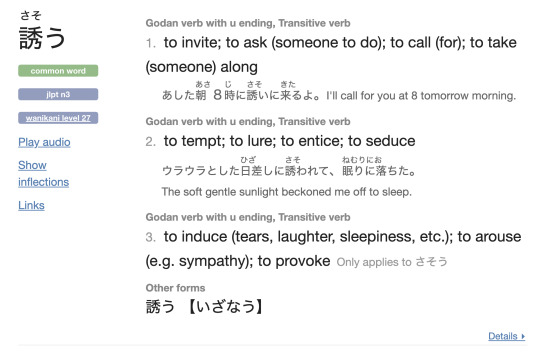
this might be completely off point but i just wanted to ramble about japanese:
the typical reading of the verb "to lure" 誘う = さそう (sasou)
after listening to the voiceline too many times ;-;; i figure rei says something like いざなう? but have no idea what that means.. so i key it into jisho and get only さそう as a result. (jisho is smart and i am not.) it takes me a while to guess that いざなう might be an archaic pronunciation of the verb
and it is!! except that's not the full explanation.
according to this user on chiebukuro, いざなう is usually used when the person invited doesn't know where they are being invited to!! so theres that nuance of suspense

i also read somewhere that いざなう leans towards a more spiritual invitation! so theres that.
tdlr; rei is just being overly dramatic. do you think that sometimes adonis doesnt get what he is saying
38 notes
·
View notes
Text
Dia's analysis masterpost
Here are all the analyses I've written, linked in a single place! (Organized in chronological order, because I think you can see a certain development in the thoughts and themes I explore in my analyses that can be best appreciated if read in order, if you're interested)
· Enstars
1. "In an autonomous life, there is meaning you'll never grasp. With the suit of your soul, persist in your belief" Lyric analysis and what it says about Hiiro's character.
2. "I think we as a fandom don't talk enough about Aira being Hiiro's fan—y'know, as an idol."
3. "An unnecessarily long post talking about what I'd like to see for the upcoming Alkaloid's solos!"
4. "Do you ever think about the parallels between Rinne and Aira"
5 notes
·
View notes
Text
"Black Out See Saw" is the Climax Alkaloid Deserved
Top Songs from Enstars 2023 Number 1
I was blown away when the album art for Alkaloid was released a few months ago...
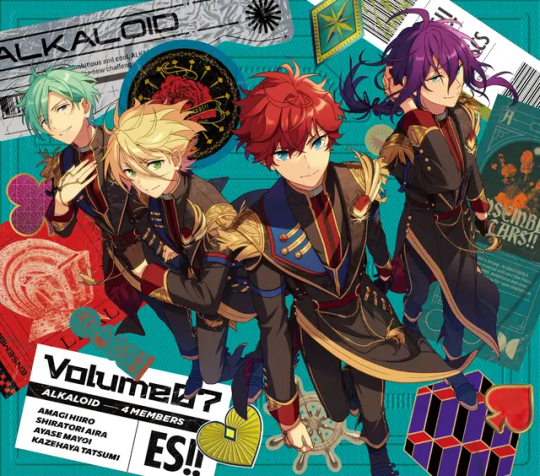
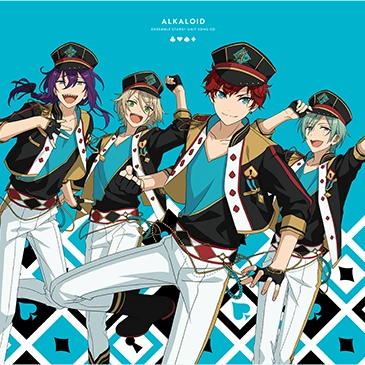
This art is such a sharp contrast from their first album art, that shows how they have grown. The basic military style unit outfits have been replaced with regal commander-style ones. The basic emotions that are shown in the original are now much more refined- in particular, Aira has evolved from someone simply happy to be on a stage to someone who is confident in his place on it, Mayoi is putting himself more in center, and Hiiro's confident smirk has become more stoic, as he now has the experience to go with his skills.
All of this went away, however, when we actually got the Alkaloid Climax song...
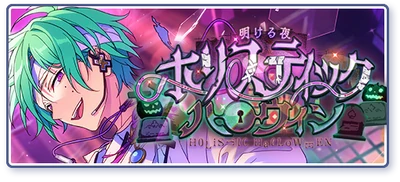
Sigh...it was the seasonal Halloween event for the year. Yes, the idea of incorporating hospital/illness and Tatsumi's relationship with it is an interesting story to tell...but Alkaloid deserved so much more, especially as the "Protagonists" for the !! era of Enstars. I was frustrated that the end of this era of Enstars for Alkaloid was wasted on a seasonal event, but was at least able to take solice in that Alkaloid gets 200 chapters of the main story dedicated to them, and we still had solo songs for each character to come from the album. December rolls around, and the album releases. After jumping through hoops to buy it, I throw my headphones on to give the album a listen. The first track, "DiZZineSS" is a weird 30 second preamble with no singing, not something I was expecting. However, it rolls directly into the first new song on the album
Bam
Black Out Sea Saw is a violent wall of sound, unlike anything else that has been done for Enstars before, and I can understand fans not liking it. The reason it sounds so different is because it was produced by TK of Ling Tosite Sigure, a 20+ year going Prog Rock group. I listened to the song 3 times before moving on, and waited for the MV release to come, as is usual with the "B" side track from Albums. And what we got was one of the most well constructed videos for Alkaloid fans, and the climax that I was looking for that wasn't provided by the Halloween song.
The video opens...strangly, especially if you haven't heard the song before. The opening is intentionally choppy and rough, almost like it was an unfinished song that still needed production. There is a weird reverb effect happening- which you can especially hear when Mayoi hits the high note, that led to a friend saying "it sounds like they recorded this in a bathroom or something". The other thing that really jumps out is how robotic and synchronized the movements of all 4 members are. This is a BIG deal. In just about every Alkaloid video, you can find little inconsistencies at various points- Aira is sometimes a bit slow to do something, Hiiro is sometimes a bit too fast, Tatsumi's movements are less athletic, etc. The robotic movements are all in perfect unison, especially at points where characters do things together, like make hand bridges. It's a sign of Alkaloid's growth as a unit- they started as a collection of rejects, and now they haver come together and become a great unit together.
As we go to the first chorus, the intensity of the song ramps up- it becomes FAST, yet every member is in perfect harmony. The dancing becomes more intense- and everyone stays perfect. And then we get to the final line "It's Error-Error", and things start to change- we start to see more finger movement, the motions become more flowing and less robotic (the robots are malfunctioning! error! error!), and more personality is shown by each member.
We then get a wonderful effect of feathers raining from the sky, before, and then we get to see everyone smile, including Hiiro with this soft and expressive look. (that I wish I was able to time slightly better when I took my screenshot!)
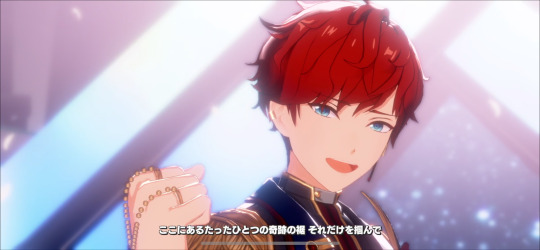
Why is this important? Lets take a look at the first Introduction of Hiiro, in his first close-up in Kiss of Life
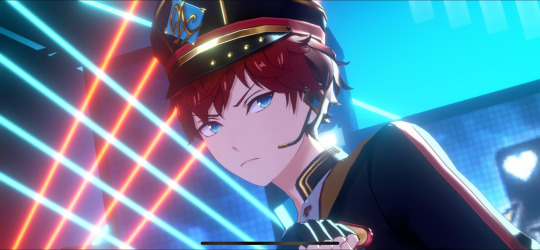
It's a look of focus, of determination, and NOT one of joy. Hiiro NEVER smiles at any point in Kiss of Life except during the SPP- he maintains a focused look the entire time. Additionally, you can look at just about any Alkaloid video, and Hiiro rarely smiles- if anything, he just physically assaults the camera in every one of them! The final chapter of the main story is titled "Smile", which is a discussion between Hiiro and Rinne on what it means to be an idol, and Rinne telling Hiiro "Whenever I see you smile, it makes me smile too", with Hiiro responding that he will do whatever it takes to make people smile


Hiiro wasn't able to smile in Kiss of Life, as his focus was on putting smiles on the faces of others. It's weird, because when he isn't preforming, a smile is basically plastered on his face permanently. He has a very loud and infectious laugh, and he's just happy to be doing anything at any time. On stage, for him, its different. And Black Out Sea Saw is the first time that Hiiro is able to not just smile, but show kindness in it, as opposed to simple joy or excitement. It's a MASSIVE step forward for him- the kind of thing that, you know, you might build a Climax story around?
And then, we come to the end, where the intensity of the song does not let up, before it all crashes to an end as the lights go dark and Alkaloid go still
To me, this is the Alkaloid Climax, the song that I will remember. They have gone from a group thrown together to a cohesive unit with a sound unlike anyone else in the franchise, and all of whom have had character growth. It's the one that they deserve going into the new era that is upcoming, and even has a level of finality to it, seeing as how it was released right at the end of the year.
Alkaloid deserved better than Undying Holy Love, and boy, did they get it...
#ensemble stars#alkaloid#hiiro amagi#tatsumi kazehaya#aira shiratori#mayoi ayase#black out sea saw#mv analysis#Enstars Climax#Best of 2023
102 notes
·
View notes
Text




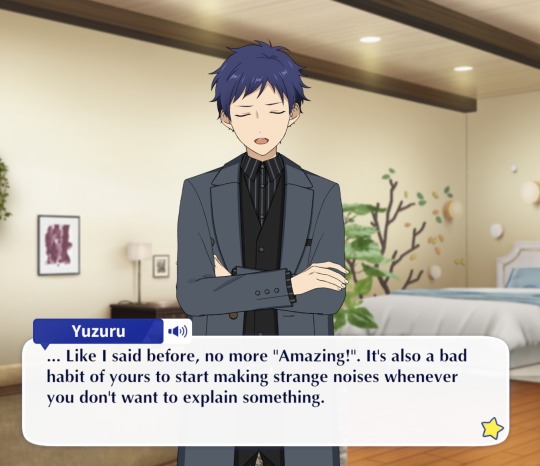
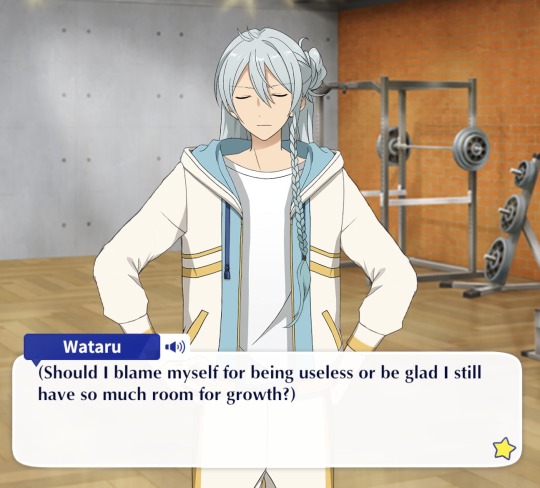
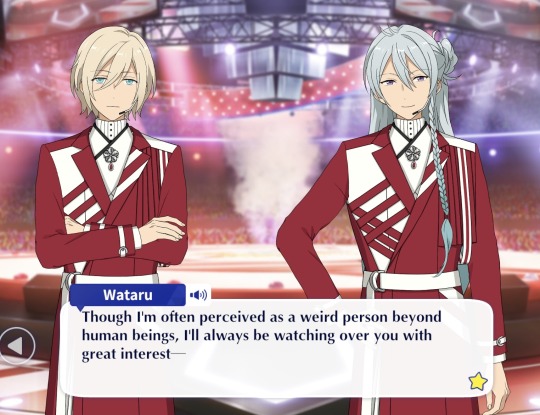
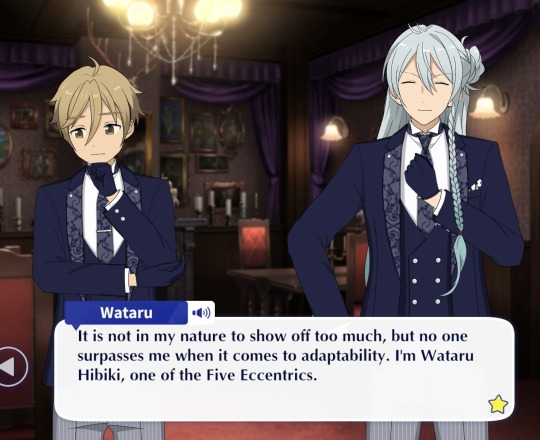


It’s Wataru’s birthday so I’m forcing everyone to look at some of my fave Wataru screenshots. It was hard to narrow down to 10 because I have a LOT and I could talk about him for ever and ever and ever
Anyway happy birthday Wataru I love youuuuuuu
#the wataei fic I’m writing is essentially just Wataru character analysis#I am so insane about him guys#Wataru Hibiki#enstars#ensemble stars#wataei
56 notes
·
View notes
Text
can we bring this au back. can we pleaseee bring this au back.
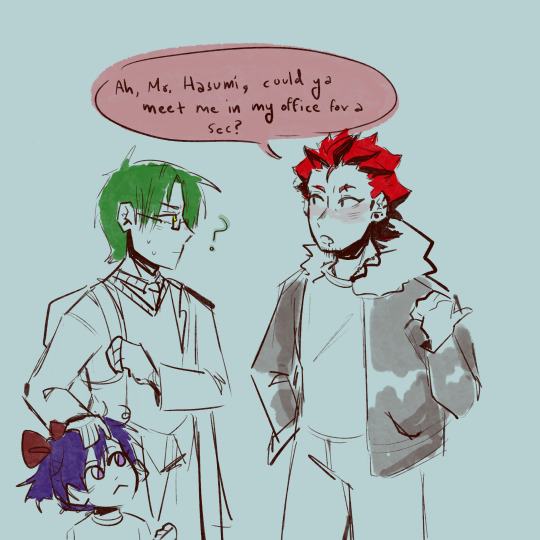

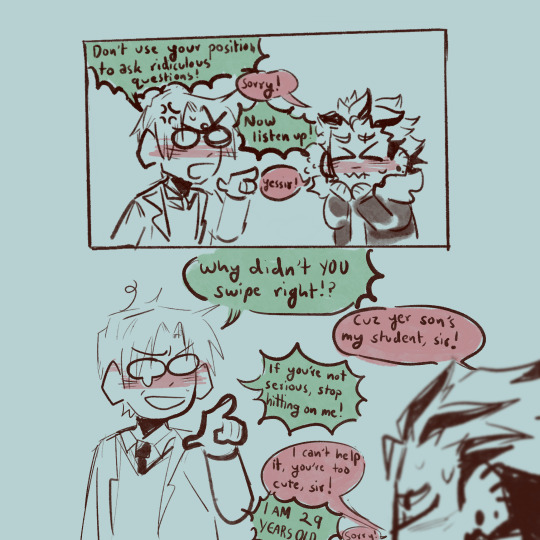
#myart#enstars#ensemble stars#kuro kiryu#souma kanzaki#keito hasumi#akatsuki#kurokei#this is a parent x teacher au#i read a fic w this premise and it hasnt left me in months now#since its fathers day… why not#sorry for not beating the kurokeiP that only sees souma as their child allegations#<- this is a joke do not come for me. i love souma. i need to crosspost more of my twt analysis on hi#also i have something to restore the balance but i wanna color it before i put it up here#my weakness… for found family… so apparent i was into fandom in late 2010s#but guys can we bring back babyverse aus#i love baby headcanons#akatsuki family you wouldn’t get it the way i do/j#okay enough. enough. ill shut up. i still feel nervous about posting this haha#kuro is 28 here this one is for my yume friend
173 notes
·
View notes
Text
Some quick thoughts that arose from listening to a youtube lecture on a topic i want to learn more about that happened to mention alice in wonderland as a case study, my mind flew, and, well, it went back to where it always does. It might not be coherent, stream of consciousness and all.
In ES1 Eichi's character revolves around the dichotomy of dreams and reality (with the addition of Wataru's dimension of illusion). His likening to Alice reflects his role as both character experiencing and creator of the narrative, whose dream is sustaining the story world. Side note for my own research, Eichi's relationship to dreams presenting as reality gets alluded to through the use of kantan no yume (an ephemeral, vain dream) in Daydream and Tea Party, on the fragility of life and dreams.
But he is also likened to the Mad Hatter in addition to Alice, going back to Eichi's own juggling of different personas and responsabilities, as he himself puts it in EP:Link, Eichi the idol, Eichi the conglomerate heir. The Mad Hatter can be taken by some to symbolize the unpleasant maddening adulthood, one Eichi's arc is taken towards in ES2. He becomes disconnected into forever pursuing and making real a dream defying natural order. Similarly to the Mad Hatter pausing the clock for it always to be tea time, Eichi is living his youth's dream by making it an eternal standard. But time plays an interesting role itself in Eichi's story, a precarious resource that is behind his actions, drive and urgency. Taking idolhood as what made life bearable, and life as uncertain, time slipping through his hands like sand, Eichi's madness and obsession with leaving behind a legacy that secures the position of idols as he sees fit is not so hard to grasp...
#im so back baby its been months since i thought of eichi properly#not that i think this is a proper analysis or anything but still#im aware of how incapable i am of expressing myself#but i will not despair...#enstars#eichi tenshouin
25 notes
·
View notes
Text
the niki shiina analysis post i heavily procrastinated on, also known as "niki shiina is stupid on purpose"
"as opposed to stupid on accident?" yes.
this goes hand in hand with my other niki shiina analysis, otherwise known as niki "why in gods name would i think about my problems" shiina.
where is this particular opinion coming from? oh well. his parents. see, the thing is, he never mentions them. we know niki's parents are out of the country and have been for at least 5 years, as during hot limit, niki's already living on his own despite being 14. while theyre mentioned by eichi in the main story, its nothing else aside from that niki's father was knocked off the air by idols, resulting in them leaving. i just think its really interesting how niki deliberately doesn't bring them up. hell, he's not opposed to other people's problems, expressing concern for rinne in the main story and kohaku during the ss arc.
another aspect of this is the "casual putting of himself down" which kohaku noted enough to comment on. it's something i think factors into what niki hopes to have others perception of him be, mostly because its his own; that he's an idiot, especially considering his lower level of education from other characters in the game (not that it matters much in his unit, considering himeru is probably the only member who got close to finishing school), but he has a few weird lines where (imo) hes pushing the idea that hes an idiot, and not that he actually is one.
for instance, in both ss and hot limit, he makes references to how he "isnt paying attention" and has "no interest" when overcomplicated idol conversations come up, meaning that it has little to do with his actual comprehension of the situations and a lot more to do with his lack of interest. even more interesting to me is when in date plan, he says that he "wants" to only think about cooking, not his usual quote that he does only think about cooking. this makes me think that niki puts up a deliberate front of being an idiot, like hes pushing for being to be underestimated.
#niki shiina#enstars#ensemble stars#quick niki shiina analysis bc i said id do it and then heavily procrastinated it!!#so here it is#tenor talks
32 notes
·
View notes
Note
imo there’s a difference between “queer coding” and very specifically playing to both sides whether or not the writers/artists/directors intended to make a character queer or not. I think that for enstars specifically, with the new valkyrie event, while people are happy that some characters such as shu and mika in the new event are being shown expressing their love for each other and their views on their sexuality and expression, people are frustrated that it is not explicitly said because of the company’s need to not confirm a character as queer in order to not alienate (homophobic!) fans. Because at the end of the day in happyele’s eyes, if that homophobic fan spends a lot of money on the game then they’re worth pandering to (shrug emoji) And I mean some people also just don’t like shumika
anon i understand where you're coming from but i think you are wildly missing the point in my original post
my point is EXACTLY that if you need the characters to walk up to the screen and say "i'm gay" or "i'm [insert some 21st century-friendly label]" or "this is my boyfriend" for it to count as queer media in your eyes than i think you need to do some reexamining about what exactly your views on queer media as a whole are
plus, they DO do this. they explicitly talk about queer themes out loud many many times in enstars. shu says to mika that they should, together, create the happiness that his grandfather was never allowed to have, after they spent the entire story detailing shu's grandfather's queer romance story. they probably kissed in hermitage, and the lyrics to acanthe talk about them kissing. rinne proposes to niki in every other story they appear in together. he told him to do a striptease during nightclub. tori has very explicitly gay feelings for eichi. arashi narukami exists. eichi, while talking to arashi in pretty mission, says "people like us," confirming himself to also be some form of queer. kuro calls keito an old word for spouse or husband. and SO many more examples. this is not "queer coding" or subtext, its just text.
in any case, authorial intent is generally of no interest when it comes to examining media. the conversation of what the author could have meant by something is wildly less interesting than the conversation about the ways in which the audience can interpret it. what the writers intended should have little to no place in the discussion. what we should be talking about is what the thing itself is saying, both implicitly and explicitly.
expanding your view on what exactly can be seen as "queer media" can only do you good. and it would do so much good to not give a shit about the possibility that homophobic people will also like the thing and interpret it as not queer. that is literally not my problem whatsoever, and it shouldn't be yours either.
what it seems like to me is that no matter what pieces of queer media will always be criticized in some capacity. if they're not explicitly queer enough, they're just bait and have no merit. if they are explicit, then they're promoting stereotypes, or its rainbow capitalism, or it's fetishization. there is no winning. the standards for queer media are absolutely absurd, but they don't HAVE to be. you don't have to look at a piece of media through this kind of silly cynical lens if you don't want to.
the discussion about a work loses so much interesting and important nuance when you try to shove it into a box of "good representation" or "bad evil queerbait." thats just really really boring way to view stories
#cryn answers#anon#enstars#i hope this clarifies my point more#also im not going to turn anon off but come on out dont be shy we can have a conversation face to face#media analysis
70 notes
·
View notes
Text
Hinata asking Rinne about how to be a better big brother when Rinne feels like a pretty awful big brother sure is... a thing I think about often. Like Rinne feels so guilty about leaving Hiiro alone in their village but at the same time he just couldn't stand to be there anymore. It takes a lot to make a kid want to run away from home so the situation must have been worse than what we've seen even from his "I've always been told I'm wrong" speech at the end of the Main Story.
So when Hinata, this kid who looks up to him and has a lot of the same problems he did at that age (the identity issues, the big brother issues, the parent issues and the dead mom issues... you get it) and asks him how he's such a good big brother... he's genuinely not sure how to react. He covers it up pretty quickly and Hinata just brushes it off as not expecting the question which is partially true, but it really makes Rinne reflect on his own relationship with Hiiro. Maybe that's what pushed him to pretend to be drunk and tell Hiiro how proud he is of him and his work. And maybe he can be a big brother (and a big brother figure) he would be proud of.
#shay speaks#not writing#enstars#ensemble stars#rinne amagi#hinata aoi#hiiro is mentioned but not enough im not gonna tag him#enstars analysis#uhm. i think about these two too much grrrr bark bark bark i cannot be the only one who thinks about them#im not aurora azurecrystalz does too on discord but im the only one who posts about them it feels like#BLOWS UP i need to eat and then maybe i'll actually work on one of my wips#also yes i checked hinata's little brother story happens in summer and rinne's 4* fs1 story happens in winter#okay? okay please i need to go insane about themmmmmmm
18 notes
·
View notes
Text
[warning: Enstars brainrot is back after a whole year, I still ramble like a nerd, spoilers for Raison d'être event story]
Valkyrie - Le temps des fleurs
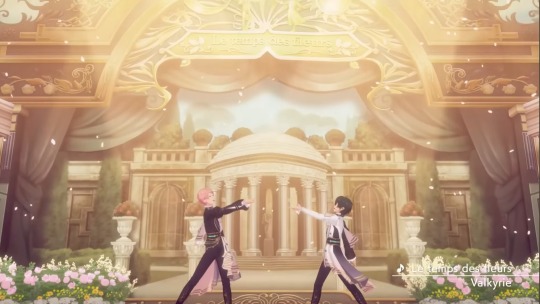
*:・゚✧ Lyrics, video and story analysis :*✧・゚
(even if it's so obviously gay)
I have resurrected my enstars obsession and I found myself fated to dissect Valkyrie's intriguing songs once again, as it seems their relationship has progressed much since last time I had checked on them. This is one going to be elaborate since the song is heavily tied to the event story Raison d'être and to the stage performance which is filled with plenty of symbolism.
˖⁺‧₊˚♡˚ Relevant links ˖⁺‧₊˚♡˚
Lyrics translation by ForeverAsia
Raison d'être translation by Mika Enstars
Official MV
*:・゚✧*:・ Title *:・゚✧*:・
The title of the song, Le temps des fleurs, which translates to "The time of the flowers", could be a reference to the infamous french song from the late 60s with the same title. The original song sung by Dalida directly derives from a russian romance song and depicts the tale of a woman who misses her lover and commemorates the time when they were together, young and carefree.
This is important to note once we provide context from the event story.
*:・゚✧* Raison d'être *:・゚✧*
In the event Raison d'être, which translates to "reason for being", a common french expression, we discover Shu's grandfather wishes to hold a live funeral and turns its preparation into a competition between the other family members. He creates a rather elaborate scenario in order for Shu to uncover the truth about his youthful days in France. Shu's succesful deduction, with Mika's help, enables him to prepare an opera for the funeral.
But Valkyrie had decided to partially cover the truth from the rest of the family in the narration of the opera. Thus, the story birthed actually ends up as an allegory for the relationship Mika and Shu have. (That is why, I will refer to the characters in the story by whom they represent)
Shu, a foreign student in France, passed by a mansion covered in roses and sighted through the window Mademoiselle, whom he fell in love with. Each time he had seen her, he fell deeper and deeper, ending up entering the mansion, unable to contain his feelings.
To his dismay, the beautiful woman he had fallen in love with turned out to be just a life-sized doll.
But the story isn't simply just that. In the mansion was also, of course, a dollmaker, Mika, who had modelled Mademoiselle after his appearance in women's clothes. Deeply moved by Shu's devotion, who had been sending love letters and had been whispering his love in the night, Mika had fallen in love with him, only having been accustomed with the solitude of his own mansion up until then.
But since the discovery of Mademoiselle's true nature, Shu had fallen depressed. Mika decided to dress up in women's clothing and warmly recognise the man's feelings.
「 Je t'aime 」
"I love you"
Mika thought it would end up as a heartfelt, passing moment and their lives would fall back into monotony. But Shu's wishes had just become true — the woman he loved had loved him back.
Since then, he had visited the mansion time and time again. Everytime there was a knock at the door, Mika would hurringly put his women's clothes and makeup on.
This concludes the first act, a comedic tale about the tumultuous existance of a same-sex relationship in a time that wasn't very accepting of it. (As stated by Shu himself)
The second act is an epilogue of the events. Shu had gone back to Japan to fulfill the duties of his family, but promised himself he'd reunite with Mademoiselle. Years later, upon his return, the mansion of roses had decayed, the flowers withering. The only thing left was an inscription on the walls, written in red as if it were fresh blood:
「 Je t'aime 」
"I love you"
-------------------------------------------------------------
Instictually, you'd think that the roles of the story should be reversed. Since Mademoiselle is an extension of Shu, and Mika is a devout follower of Shu as an artist, wouldn't it make more sense for Shu to be the dollmaker and for Mika to be the foreign student?
That is clarified by the diverse use of the pronoun "I" in japanese throughout the retelling of the story by Shu and Mika. When talking about the foreign student, they use "boku", the pronoun version Shu usually uses. The dollmaker, instead, uses "ore", the pronoun version Mika uses. With that in mind and a little thought put into it, you'd see the pieces falling into place.
The first act depicts the relationship Mika and Shu had up until that point. Shu had fallen in love with Mika, the marionette, but the events of Valkyrie made him realise Mika being a mere marionette in his eyes was inhumane — it wasn't real love, but a devout admiration. Mika, though, had proven himself, slow and steady, to be a real human with free-will, wishes and ambitions, in front of the person he loved — an equal. Thus, Shu could truly love the person he only dreamed of loving previously because love can only really bloom between two equals.
The second act depicts Shu's fears about their future. At the beginning of the event story, he reveals he had already prepared a room for Mika to live in Paris so they will continue their lives together. When Mika told him about wanting to remain in Japan after graduation to maintain Valkyrie , Shu spirals out of control, betrayed and fearful. In his eyes, Mika refused maintaining, or even strenghtening, their relationship. In the opera, that is what Shu imagines would happen if they remain separated; one day, Shu would not find Mika waiting for him, having dissapeared from his life, their love withering.
Unlike the opera, we will discover the song, Le temps des fleurs, "ties the knot" of their thread of troubles and feelings.
*:・゚✧* Lyrics & MV *:・゚✧*
[Shu] - pink
[Mika] - green
[Shu and Mika] - blue
In the stage background is depicted the Eiffel Tower to represent where the story takes place, in Paris. This coincides with the city where Mika and Shu sort out their feeling about their future.
Mistakably compared to a marionette, those blue eyes seem vacant
As this foreign romance spun with a stranger begins to close
Wayfaring through an illusion, traversing on streets of stone
Wandering, endlessly, like melting wax dripping in diurnal rhythms
The two commemorate the circumstances of their early relationship, Shu mistaking Mika, a masterful artist, for a mere marionette, leading to a temporary love that couldn't truly exist this way, that melts with each passing day under the sun rays.
The night burns into the dawn, and the heart that yearns without reward
Has long since overlapped
Even if it’s the same as the breeze, that blows through in its flurry of gales
Even if Shu finds out the truth, that love for a doll can't be truly love, he still holds onto it despite all the misfortunes that have come his way, mainly the rough days of Valkyrie. His love for Mika was a "breeze", a gentle wind, in the midst the despair reminiscent of a "flurry of gales", a circular mass of strong winds that entrapped him.
In the MV, during this part, Shu and Mika hold hands and sway together as they sing. It is a crucial moment since (from my knowledge so correct me if I'm wrong) Mika and Shu haven't made such heartfelt gestures on stage before. It highlights how the songs have gradually become more concentrated on themselves, rather than Valkyrie talking to the audience like in the past.
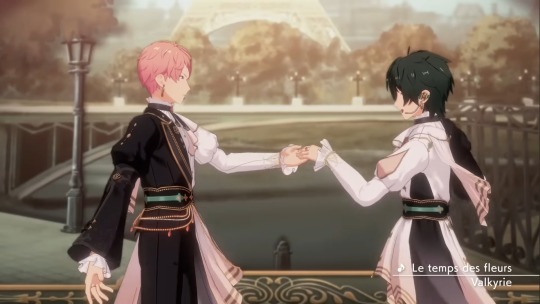
O city of flowers, this love too can bloom, even on the wayside.
It shall remain as a single song
Sear that gorgeous splendor onto each other’s hearts
As this beloved shadowed silhouette[1]
Turns this into a phantasm tale
From the story of the opera written by the two, we can conclude that flowers represent love. Paris, the city of flowers in this case, is also the city of romance.
Even if their feelings seemed impossible of becoming reality because of the rather troubled beginning of their relationship, their strenght had led the two to believe it is possible to achieve, "even on the wayside". They would even accept it even if it were just a passing moment, "a single song", as long as it was real and satiatied their desires by "searing that gorgeous splendor on each other's hearts". When the moment of love would cease to exist, if it ever does, they believe it will be immortalized in their memory as a "phantasm tale", thus having no regret ever experiencing it.
During this moment, the MV background switches to the Temple of Love on the grounds of the Palace of Versailles. The choreography in front of this place dedicated to the women "loved" by the french royalty[2] is also very suggestive of the ignition of romantic feelings. Mika and Shu reach out their arms to each other's hearts as the camera focuses on their shared gazes during the moment. Not long after, the camera focuses on their hands as they join together in front of the Temple of Love, signifying their romantic union.
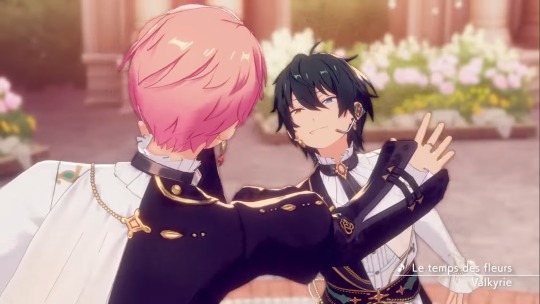
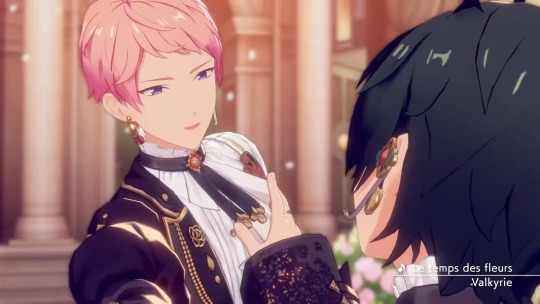
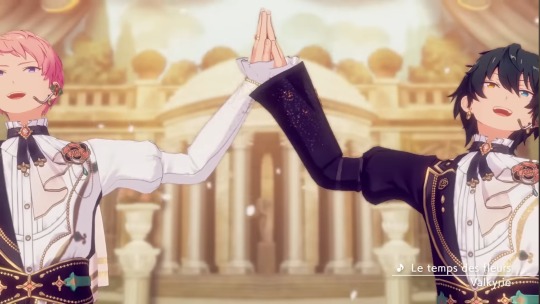
[1] The original translation on the fan wiki says "silhouettier", which is a word I couldn't find on any online dictionaries. I will assume they meant "silhouette", like other translations.
[2] The factuality of that statement could be debatable, but I am no expert in the matter, nor is it the focus of my point.
-------------------------------------------------------------
[The following segment isn't in the MV so it will be delimited with red.]
Even if we cling onto such ridiculous prayers
The feeling of hopelessness will never disappear, will it?
In that case, let’s leave the meaning of our encounter behind
As we change the regalia belonging to coincidence and fate
In this verse, they seem to be voicing each other's perception of their new relationship.
Shu is still on the edge about their future, as seen especially at the beginning of the event story. Despite both of them having shared such devotion for each other, he cannot help but feel hopeless that it would all end at any step.
Mika recognizes this and keeps looking forward, wanting Shu to adopt the same way of thinking. He has also been the first push that had led to the rehabilitation of Valkyrie, with the help of his faith in his mentor and the love he harbors for him. In this verse, it is also suggested that Shu isn't quite over their relationship during the ex-Valkyrie, thus the source of his hopelessness. It is also evident in the event story when he keeps mentioning Mika had become a human, probably fearful they would regress to their past dynamic.
Some things are unforgivable
Rather than grieving over those sins
Shall we dance the night away instead?
As I reach out my hand to you
And for you to look back at me
They seem to accept their irredeamable past that had led them to the present moment. If it meant reaching that point where they could share their love, "dance the night away", reach out their hands and look back at each other, it was worth it.
Is it possible to worry about the destination of an endless dream?
Even if it’s something that is not finite in nature
Let’s keep it forever, the shine that lasts only in this world
As we are sought and lured by each other
While having our souls turn into a phantasm tale
Unlike the love for a marionette that would melt with each passing day, this love, the love of an equal, is an "endless dream" and "not finite in nature". This current love that they share is more important that their "destination", meaning that they shouldn't worry about the future, which they did at the beginning of the event story, since their love would triumph even against time. This act of being "lured by each other" is compassionate enough to not just dissapear, get immortalized in their memory as in the first chorus, but instead the devotion for each other would be the one to immortalize them as lovers of a "phantasm tale".
-------------------------------------------------------------
Before the bridge commences, the background of the MV becomes pure white, turning Mika and Shu into mere silhouettes. The atmosphere is heavy. When they try to reach out for each other, they miss each other's embrace, unable to look back at one another. This could represent the moments when they feel lost during their relationship, an example being the opening scene of the event story.
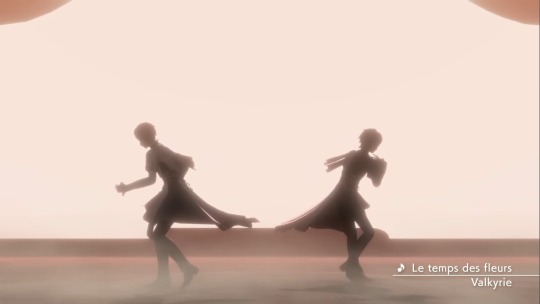
Even if it’s worn and arenaceous
If you lift its casing, its contents will overflow
So even if time is bound, the shades and chromes will still remain
Painting the future in a blinding iridescence
Each verse of the first three is split in half between the two, representing a separation, but proving that, despite the circustances, they share the same feelings about their relationship.
Even if their love is "worn and arenaceous", almost on the brink of dying, "if you lift its casing", its coffin's lid , it will prove to be as strong as ever, "overflowing". Even if their love will die out, its impact will leave an imprint on their lives.
In the final verse, their voices join and their gazes meet. The conclusion is that, no matter the outcome, their love would brighten their future with "a blinding iridescence". Stripping themselves of the worries about both past and future, by embracing the present moment of their love, they have freed themselves.
In the background, the Arch of Triumph is revealed and the stage is filled with blooming flowers, a symbol of their love as established earlier. Then, the second[1] chorus begins.
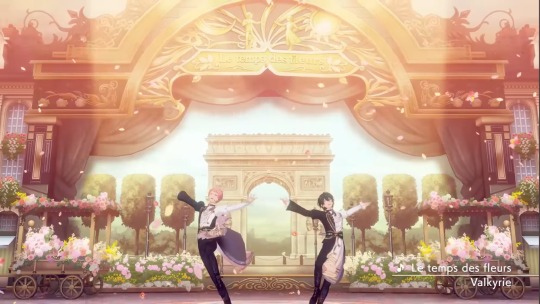
[1] It is the third chorus if we talk about the entire song. But since this chorus mirrors the first one, it would be more suggestive to call it the second one, like it is in the MV.
O city of flowers, the entire town itself is wrapped in your love
Even the days that passes on by has bloomed and scattered
Let this continue to reverberate forevermore inside each other’s hearts
As this beloved shadowed silhouette
Manifests for this very reason to make you dance
Alongside this song of love, this song of love
The choreography is the same as the one in front of the Temple of Love. If the first time it was about the reciprocity of their feelings that had no clear duration, this time it is the confidence that they are eternal. Mika and Shu are victorious in their love's battle against time and, once again, can reach out for their hearts, look back at each other and join hands.
The final statement is made as their love is finally triumphant over all the hardships Valkyrie had to endure. Their love is so radient, "the entire town itself is wrapped" in it. Even if these moments of love, which have bloomed, would "scatter" in the past, they believe their feelings would keep "reverberating forevermore inside each other's hearts". The song ends with the acknowledgement of its true nature, it being a "song of love".
The MV ends with Mika and Shu looking into each other's eyes, arms ready to reach one another, but far enough to not yet be touching each other — for it is only the first step in their true relationship. The camera pans to Shu's face who, usually, doesn't allow for his affectionate side to surface easily, lovingly looking at Mika.
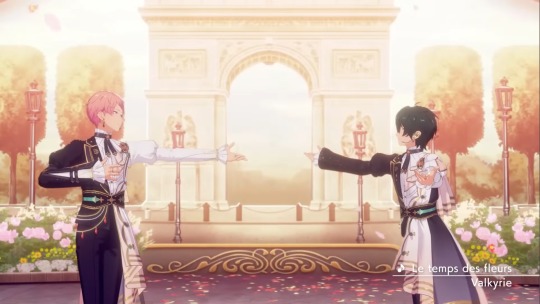
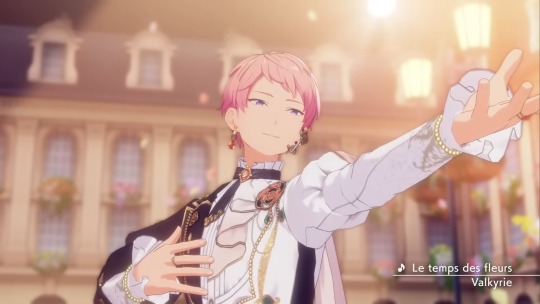
On a final note, it is really important to mention the outfits. There could be many interpretations for the split appearance of them: funeral and marriage, shadow and light, masculinity and femininity. Either way it may be, the outfits themselves represent union. If in the past, for example in "Eternal Weaving", Mika and Shu were distinguished by a certain symbol, like shadow and light, through their love, they have attained balance. It is both a funeral and a celebration of love. The clothes are the recognition that the lovers are both composed of light and shadow and that they complete one another. They are a symbol about appearance and essence, where one half is seen by the world (Shu in a tuxedo, strong and independent; Mika in a dress, soft and innocent) and the other only by the lovers (Shu in a dress beause he is quite emotional and compassionate; Mika in a tuxedo because he is strong-willed and would do anything for their hapiness together).
In the silence that follows, we can only have faith their love would prevail over anything in their way of looking into each other's longing eyes.
*:・゚✧*:・゚✧*:・゚✧*:・゚✧*:・゚
Thank you for bearing with me! I am so crazed by their love story I had to go all out. I don't think straight romance has achieved this kind of depth yet, I am afraid. (Don't try to prove me wrong, I am right).
#ensemble stars#enstars#ensemble stars music#rhythm game#ensemble stars valkyrie#valkyrie enstars#shu itsuki#mika kagehira#shumika#music#music analysis#lyric analysis#lyric interpretation#lgbtq#gay gay homosexual gay#utter rambling
28 notes
·
View notes